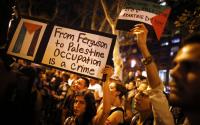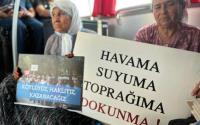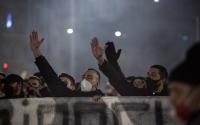19 August 2005The Independent
Latin America is a graveyard of false prophets. On every corner there is a reminder of the political Messiahs who failed. Bolívar, Che, Evita, Fidel - all are remembered in statues and wall paintings that look out over a continent now almost as poor and unfree as Africa.
But something is rumbling here in the barrios around Caracas, something that is causing tremors in the White House. A Salsa revolution is spreading out from the slums of Venezuela, and it is the first in Latin America to be both totally democratic and, gradually, startlingly effective.
But to begin this story, I have to take you on a tour of the Old Venezuela. Barrio Nueva Tacagua is a shanty-town in the high hills that sprawl around Caracas, built by the government at the height of the 1970s oil boom. The hundreds of homes here are made of pressed cardboard and rusting tin. They are connected by paths made of more of the same, with the odd bedspread tossed in.
The barrio nestles in what looks like a river of trash and shit. Because there is no rubbish collection, because the sewers cannot cope with solids, everything is simply thrown further downhill, in the hope it will rot away. Children with old, lined faces play there.
Gladys de Tarate lives in a swollen sardine tin with her four children, her husband, and her mother. She tells me: "This land was never meant to be built on. It is not safe. We are on a fault-line, and we feel like we are waiting for the next mudslide, like the ones in 1999 that killed tens of thousands of people."
But there are more immediate worries: when it rains, the water crashes downhill so fast it can carry cars and homes with it. Last month, it took a small girl.
In the early Eighties, the government sent some trailers here and boasted about it for years - but they were unbearably hot, "like ovens on the inside", one man explains, and had to be trashed. The public sector was virtually non-existent: nobody here saw a doctor except in the most extreme emergencies, and the school closed for three years after the roof caved in.
This is the life that was given to the 80 per cent of mostly brown-skinned Venezuelans, locked out of the country's white oligarchy under 40 years of corrupt pseudo-democracy.
That Venezuela is collapsing. Not just metaphorically but literally. The barrios are sagging down the hills; homes disappear in landslides every other month. And - as a result of the slow-burn social revolution here - these communities are (at last) being relocated or rebuilt as part of what everybody here calls "The Process."
To understand how The Process began, you have to go back to 1991 - the year the old Venezuela reached its nadir. The International Monetary Fund (IMF) demanded the elected government of Carlos Perez cut the tiny thread of government support provided to places like Barrio Nueva Tacagua. As ever, they put their own neoliberal ideology - small government, low taxes, make everyone pay for public services - above democracy.
Even though Perez had campaigned on precisely the opposite platform, he gave in. The price of food quadrupled, unemployment soared, and the meager scraps of public services available to the poor were cut. The barrios erupted.
The government's response? A massacre of over 500 people. Residents of this barrio remember machine-gun toting soldiers arriving on the day of the uprising. They shot a man and tossed his body downhill. The protests ended.
But from this IMF-led chaos, they explain, an alternative emerged. A left-wing Venezuelan general, Hugo Chávez, began to articulate an alternative to the neoliberalism that had been imposed on Latin America for over two decades - the neoliberalism that has created the slowest economic growth and the highest inequality in living memory. In 1998 he was elected president. Since then, he has been approved - in free, open elections and referenda - no less than seven times.
The Chávez Process is made flesh in a woman called Maria González, who I stumbled across in one of Venezuela's roughest barrios. She is a 60-year-old woman with a determined face and a sweet swarm of grandchildren buzzing around her. She was sitting in a class in one of the tens of thousands of educational "missions" established by the Chávez government. After the government doubled education spending, the barrios are now filled with new schools. These aren't just for children, but for the adult majority who were failed by the education system.
Maria explains that, in the old Venezuela, most people left school at the age of 12. She wasn't even that lucky - she wasn't educated at all. Like millions of Venezuelans, in the midst of spurting oil wealth she was left illiterate and innumerate. She brandishes a piece of chalk with a smile, and slowly, carefully, writes her name on a blackboard. She turns to me and offers a small nod. "I have worked all my life like a mule. But now I will not die as ignorant as a mule," she says.
In every barrio, I seek out the medical missions, one of the other jewels of the new Venezuela. These are freshly minted clinics - acquired with the country's oil wealth - where the poor are seeing doctors, often for the first time in their lives. Thousands of sickly Marias troop through for medicine every week: I met many who said they would be dead without the missions.
Often, those of us concerned about human rights think only in negative terms - a massacre here, a prison there. But all across Venezuela I keep finding the polar opposite of massacres in the missions: people mown back to health with medicine-bullets. They have even appeared in Barrio Nueva Tacagua while its residents wait for relocation.
Despite all this, the democratising process in Venezuela has been subject to torrential demonisation and even a (briefly successful) coup. The core reason for these assaults on Venezuela's elected government is stark. Oil wealth is supposed to trickle (no, cascade) upwards to multinational corporations, not downwards towards the poor.
The president sitting on the largest pot of oil outside the Middle East is not supposed to listen to his people and spend his country's petrodollars on education and health. He is not supposed to increase taxes on the likes of Halliburton from a negligible 1 per cent to 17 per cent in order to pay for schools and hospitals for people like Gladys and Maria.
A classroom, a hospital, a barrio: these might sound like unlikely locations for a social revolution. In Europe, we take it for granted that our governments should provide these services for the poor. But on a continent which has had neoliberalism undemocratically forced down its throat for decades, it has taken a Salsa revolution - the loud, proud call from the barrios of Venezuela - to produce social democracy.






